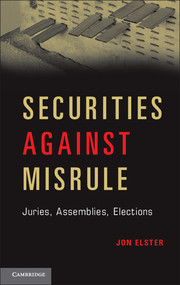Book contents
- Frontmatter
- Contents
- Preface and Acknowledgments
- Introduction
- 1 The Normative Study of Collective Decision Making
- 2 Ignorance, Secrecy, and Publicity in Jury Decision Making
- 3 A Dialogue with Bentham
- 4 The Optimal Design of Constituent Assemblies
- 5 Cross-Voting: A Study in Failure
- Conclusion
- References
- Index
- References
Conclusion
Published online by Cambridge University Press: 05 March 2013
- Frontmatter
- Contents
- Preface and Acknowledgments
- Introduction
- 1 The Normative Study of Collective Decision Making
- 2 Ignorance, Secrecy, and Publicity in Jury Decision Making
- 3 A Dialogue with Bentham
- 4 The Optimal Design of Constituent Assemblies
- 5 Cross-Voting: A Study in Failure
- Conclusion
- References
- Index
- References
Summary
The negative Benthamite approach to collective decision making has a number of definite implications. Let me cite some representative examples from earlier chapters:
Screening jurors and voters from bribes and threats
Screening constitution-makers from soldiers and crowds
Separating the constituent and legislative powers
Combining ex ante secrecy and ex post publicity of voting in juries and assemblies
Publishing the names of abstainers in national elections
Enforcing a ban on the sale and serving of liquor to jurors and voters
Enforcing a delay between the last public debates and opinion polls on the one hand and election day on the other
Putting the assets of public officials into blind trusts
Adopting a ban on cumul des mandats by representatives
Adopting a cap on aggregate campaign contributions
Adopting the constructive vote of no confidence
Seating deputies on benches rather than at desks
Seating jurors in unadorned rooms
Selecting jury forepersons by secret ballot
Offering jurors information in ways that minimize cognitive bias, for example, in terms of natural frequencies rather than probabilities
Disallowing knowledge of a defendant’s previous criminal record
Delaying jury trials in highly publicized cases
I shall not belabor the virtues of the general Benthamite framework, but take up the issues I mentioned in the Introduction: the costs of decision making, the value of diversity, the need for institutional overrides, the question of whether the negative approach might be indeterminate, and the need for a political will.
Costs
For Bentham, reducing the cost of political decision making was a crucial desideratum. As I noted in Chapter 3, he thought, somewhat incoherently, that the measures that would maximize the aptitude of deputies and officials would also minimize expenses. In reality, there is often a trade-off. We may not be able, however, to determine its shape.
- Type
- Chapter
- Information
- Securities against MisruleJuries, Assemblies, Elections, pp. 272 - 288Publisher: Cambridge University PressPrint publication year: 2013



